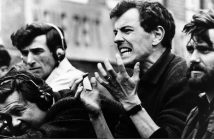“Did you see that film on TV last night? The one that was based in a sock factory, you know, the sock factory in Uruguay? You know the one, minimal dialogue, subtitled? The one with the loose storyline, you know it? The main character hardly says anything. Did you see it? The one that had loads of repetitive scenes, scenes of the characters going about their daily routine in the Uruguayan sock factory, that one. Did you happen to catch it? Pardon? No it was visually spectacular and equally hilarious with an underlying sense of tragedy actually.”
Jacobo runs a sock factory. He lives a mundane life with little deviation from his routine ways. When his older, more successful brother Herman (albeit through a more successful sock factory) comes to stay with him for their mother’s funeral, he asks his dependable colleague Marta to pose as his wife. The three of them go on a short holiday, but when Herman gravitates towards Marta, personal objectives are covertly shuffled. All the while Jacobo is infuriated by his brother’s happiness and self-motivation. It’s a plot that doesn’t hurry along, instead it’s blown along at snail-like pace, not dissimilar to the manner in which Jacobo lives his humdrum life.
There is a moment at the heart of the film when the three of them have a photo taken. Upon being asked to say “whisky” by the photographer, a despondent Jacobo produces a smile as artificial as his devotion to Marta. The picture is taken and his face drops in an instant, as if being weighed down by a ton of socks. The beauty of Whisky lies in these subtleties, and not in a way that rolls around laughing in the face of anyone who doesn’t understand it, but it allows you to have your own perception of each moment. You can read into a false smile in a photograph only as much as you wish to, you may also wish to dismiss it as boring, unfunny and pointless.
Out of context, these little quirks probably do appear boring, unfunny and pointless, it’s only when you start to pity Jacobo and warm to his impassive charm that you can appreciate such moments. He’s a man whose car never starts, his office blinds are broken, he supports a failed football team and never has anything to look forward to, but even with all this, his entire character can be summed up in split second moments, a definitive of a good character.
Marta’s character is as tragic as anyone’s in the film, but at no point is her story ever addressed. You speculate over why she accepts Jacobo’s request so readily and the cause of her introverted nature, yet suspicion is only aroused by a rigorous approach to her role as Jacobo’s stand-in wife and prolonged glances at her provisional wedding ring.
These blink-and-you-miss-it moments become a useful tool in capturing the spirit of every emotion and every relationship. Jacobo’s awkward relationship with Marta can be condensed into one moment when Jacobo walks into the bedroom and Marta immediately walks out, as if by impulse. Elsewhere, whilst there is constant hostility between Jacobo and his brother, you can’t help but side with Jacobo for his idiosyncratic moments of affection. When he exchanges presents with his brother at the airport (albeit socks from their respective factories), he is the only one who has made the effort to wrap his up. The deftness of such moments makes for a poignancy that can’t be achieved through conclusive dialogue, because when you discover something for yourself you really feel it.
This film first hit the big screens at the 2004 Cannes Film Festival, since then directors have been striving for more complex and far-fetched plots to remain innovative and to wave their arms in the direction of the big movie awards. There is also the small matter of 3D cinema. Films like Avatar remove the excitement of a few stray branches that leap out of the screen and you’re left with little in the way of plot apart from the usual disadvantaged character / falls in love / big fight formula. As for last year’s hit Inception, as brilliant as the concept was, the amount of time the characters spent explaining what was going on to each other, they may as well have just turned to the camera and gone through it with the viewer.
It’s refreshing then to go back a few years and discover a film that does nothing to insult your intelligence and allows you to pick up on interesting points without feeling utterly brainwashed. The characters and scenarios are real, you can relate to them and you think what they think. You can immerse yourself in the mundane and revel in its honesty. After all, who wouldn’t want to watch a film based in a Uruguayan sock factory? Who needs more than a hatful of words to tell a story? Who doesn’t find jokes about misspelling names, holiday photographs, adversity, low-life and despair funny? No?
The best bit? It has to be when Jacobo hands his brother a fridge magnet depicting a ‘thumbs up’ and on having it returned, aggressively slams it back on the fridge door with the thumb pointing down…erm…I think you have to see it really. No really, you have to see it; it’s genius.
Whisky (2004) by Juan Pablo Rebella and Pablo Stoll.




